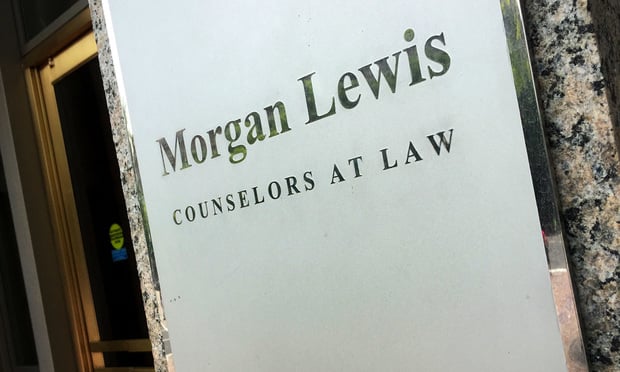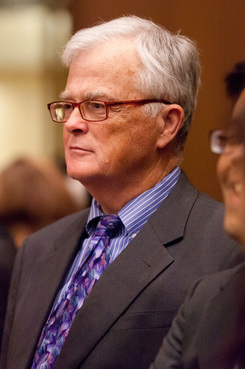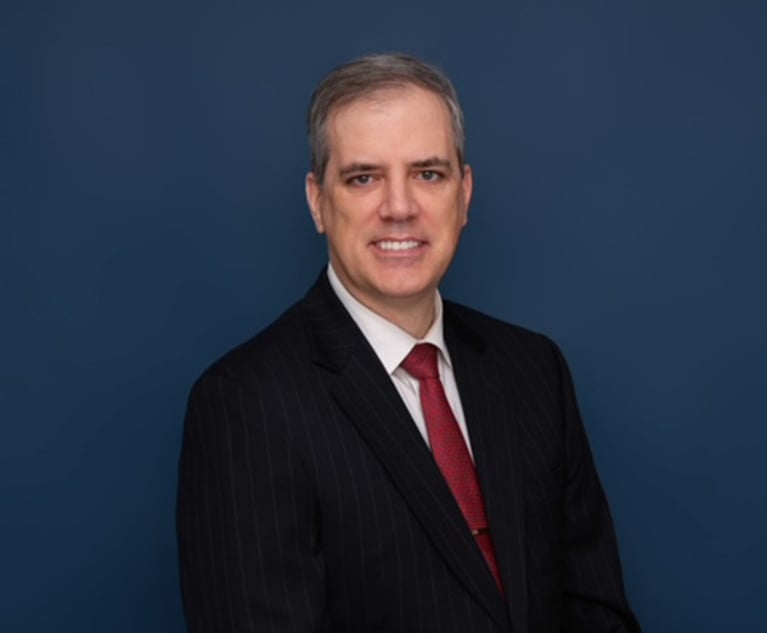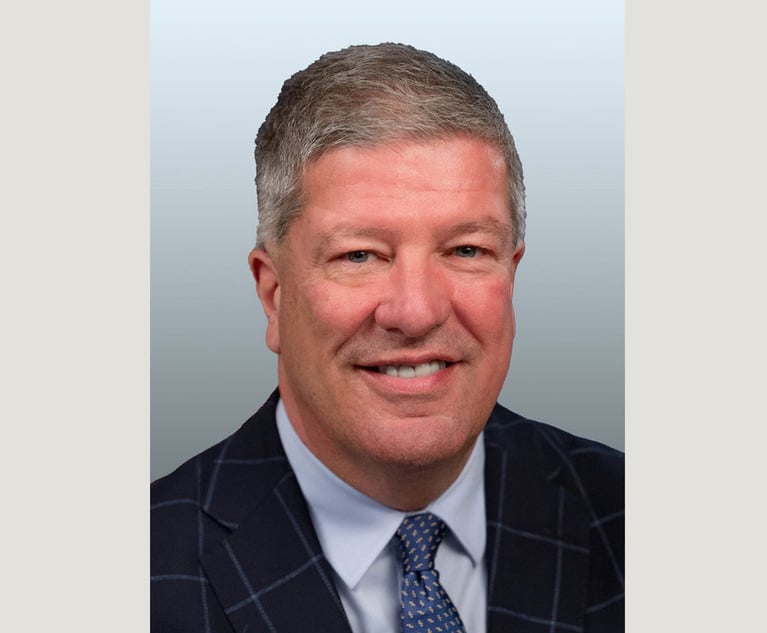Judge Cites 'Troubling' Morgan Lewis Conduct, but Firm Skirts Disqualification
"Morgan Lewis apologizes to the court for allowing this issue to arise," partner Jason Mills told U.S. District Judge William Alsup, presiding over a wage-and-hour class action.
March 14, 2018 at 12:59 PM
4 minute read
The original version of this story was published on The Recorder

Morgan, Lewis & Bockius won't be disqualified from representing a hotel company in a California wage-and-hour class action, but a judge, citing his concerns about “troubling circumstances” involving the firm, imposed restrictions on the defense team.
U.S. District Judge William Alsup of the Northern District of California on Monday certified the class in a suit against Interstate Hotels & Resorts Inc. and Interstate Management Co. At the same time, the San Francisco-based judge said Morgan Lewis would be prohibited from cross-examining several would-be witnesses.
Morgan Lewis, which represents the Virginia-based hotel chain, was criticized by Alsup and the plaintiffs attorneys for representing would-be class members at their depositions without obtaining written consent beforehand. The firm, Alsup said, obtained declarations from hotel employees to oppose class certification. Morgan Lewis argued there was no conflict.
 William Alsup. Credit: Jason Doiy / Recorder
William Alsup. Credit: Jason Doiy / RecorderAlsup, citing the “troubling circumstances” about the origin of the declarations, ordered them struck. He added that the defense counsel will not be allowed to cross-examine at trial or on summary judgment any hotel employees the firm represented. Big Law Business reported this week on the order.
The lead plaintiff, Dina Rae Richardson, a hotel room attendant, will be joined by roughly 350 hourly hotel workers in the class. Richardson, represented by the Matern Law Group of Manhattan Beach, claimed in her suit in the U.S. District Court for the Northern District of California that management required workers to forego breaks and work off-the-clock at the Sheraton Fisherman's Wharf Hotel in San Francisco.
The hotel has denied the allegations and said the claims did not represent a “sweeping” practice that prevented workers from taking lawful breaks.
The Morgan Lewis team, led by partner Jason Mills in Los Angeles, told the court in December that the defense lawyers “evaluated the propriety of the limited representations and concluded there are no conflict in the circumstances.” Mills said the team—which included three associates—“completed the representations professionally and within the limited scope they believed the ethical rules permit.”
Mills added: “Where the circumstances show, at most, an accidental transgression motivated by good intentions, disqualification is not necessary to reinforce to these lawyers the importance of maintaining ethical standards.”
Mills was not immediately reached for comment Wednesday, and Morgan Lewis did not immediately return a message seeking comment.
Alsup declined to disqualify Morgan Lewis from its work for Interstate Hotels, a client for whom the firm first handled a wage-and-hour case in 2014. (Mills told the court in a declaration that the firm has handled “many more” for the hotel company since then.)
Still, Alsup said he was “bothered” by Morgan Lewis' role in representing three would-be class members.
“The foregoing unilateral and one-sided procedure followed by defense counsel bothered the court both because it undercuts the reliability of the resulting declarations and because defense counsel knew they were dealing with employees putatively adverse to their employer and its counsel—employees that Richardson and her counsel sought to represent,” Alsup said.
Alsup said in his order that “defense counsel represented more than one client with at least potentially conflicting interests in this litigation, without obtaining informed written consent beforehand and in violation of” the California rule governing the representation of clients with adverse interests. The judge said Morgan Lewis “could be disqualified entirely from the case as a result.”
Mills, writing in a court filing in December, told Alsup: “Morgan Lewis apologizes to the court for allowing this issue to arise.” And the firm vowed that it had learned from the experience.
“In hindsight, the better practice would have been to obtain, in an abundance of caution, advance written waivers from Interstate and the three former employees, or to have offered separate counsel to the three former employees for representation at their depositions, or to have simply defended the depositions without representing the three former employees,” Mills wrote. “Morgan Lewis will certainly not repeat this conduct, in this court or any other.”
This content has been archived. It is available through our partners, LexisNexis® and Bloomberg Law.
To view this content, please continue to their sites.
Not a Lexis Subscriber?
Subscribe Now
Not a Bloomberg Law Subscriber?
Subscribe Now
NOT FOR REPRINT
© 2025 ALM Global, LLC, All Rights Reserved. Request academic re-use from www.copyright.com. All other uses, submit a request to [email protected]. For more information visit Asset & Logo Licensing.
You Might Like
View All


Stevens & Lee Hires Ex-Middle District of Pennsylvania U.S. Attorney as White-Collar Co-Chair
3 minute read
Judge Tanks Prevailing Pittsburgh Attorneys' $2.45M Fee Request to $250K
5 minute readTrending Stories
- 1Decision of the Day: Court Holds Accident with Post Driver Was 'Bizarre Occurrence,' Dismisses Action Brought Under Labor Law §240
- 2Judge Recommends Disbarment for Attorney Who Plotted to Hack Judge's Email, Phone
- 3Two Wilkinson Stekloff Associates Among Victims of DC Plane Crash
- 4Two More Victims Alleged in New Sean Combs Sex Trafficking Indictment
- 5Jackson Lewis Leaders Discuss Firm's Innovation Efforts, From Prompt-a-Thons to Gen AI Pilots
Who Got The Work
J. Brugh Lower of Gibbons has entered an appearance for industrial equipment supplier Devco Corporation in a pending trademark infringement lawsuit. The suit, accusing the defendant of selling knock-off Graco products, was filed Dec. 18 in New Jersey District Court by Rivkin Radler on behalf of Graco Inc. and Graco Minnesota. The case, assigned to U.S. District Judge Zahid N. Quraishi, is 3:24-cv-11294, Graco Inc. et al v. Devco Corporation.
Who Got The Work
Rebecca Maller-Stein and Kent A. Yalowitz of Arnold & Porter Kaye Scholer have entered their appearances for Hanaco Venture Capital and its executives, Lior Prosor and David Frankel, in a pending securities lawsuit. The action, filed on Dec. 24 in New York Southern District Court by Zell, Aron & Co. on behalf of Goldeneye Advisors, accuses the defendants of negligently and fraudulently managing the plaintiff's $1 million investment. The case, assigned to U.S. District Judge Vernon S. Broderick, is 1:24-cv-09918, Goldeneye Advisors, LLC v. Hanaco Venture Capital, Ltd. et al.
Who Got The Work
Attorneys from A&O Shearman has stepped in as defense counsel for Toronto-Dominion Bank and other defendants in a pending securities class action. The suit, filed Dec. 11 in New York Southern District Court by Bleichmar Fonti & Auld, accuses the defendants of concealing the bank's 'pervasive' deficiencies in regards to its compliance with the Bank Secrecy Act and the quality of its anti-money laundering controls. The case, assigned to U.S. District Judge Arun Subramanian, is 1:24-cv-09445, Gonzalez v. The Toronto-Dominion Bank et al.
Who Got The Work
Crown Castle International, a Pennsylvania company providing shared communications infrastructure, has turned to Luke D. Wolf of Gordon Rees Scully Mansukhani to fend off a pending breach-of-contract lawsuit. The court action, filed Nov. 25 in Michigan Eastern District Court by Hooper Hathaway PC on behalf of The Town Residences LLC, accuses Crown Castle of failing to transfer approximately $30,000 in utility payments from T-Mobile in breach of a roof-top lease and assignment agreement. The case, assigned to U.S. District Judge Susan K. Declercq, is 2:24-cv-13131, The Town Residences LLC v. T-Mobile US, Inc. et al.
Who Got The Work
Wilfred P. Coronato and Daniel M. Schwartz of McCarter & English have stepped in as defense counsel to Electrolux Home Products Inc. in a pending product liability lawsuit. The court action, filed Nov. 26 in New York Eastern District Court by Poulos Lopiccolo PC and Nagel Rice LLP on behalf of David Stern, alleges that the defendant's refrigerators’ drawers and shelving repeatedly break and fall apart within months after purchase. The case, assigned to U.S. District Judge Joan M. Azrack, is 2:24-cv-08204, Stern v. Electrolux Home Products, Inc.
Featured Firms
Law Offices of Gary Martin Hays & Associates, P.C.
(470) 294-1674
Law Offices of Mark E. Salomone
(857) 444-6468
Smith & Hassler
(713) 739-1250





